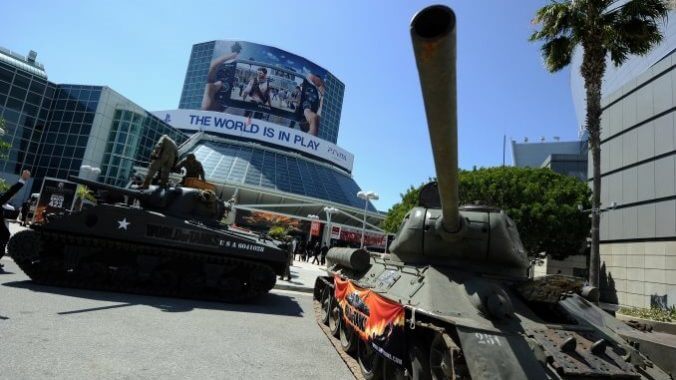E3, the videogame industry trade show that started in 1995, is done, the Washington Post reported today. Its organizer, the Entertainment Software Association, has scrapped plans to revive a show that never really recovered from the first year of the pandemic. With press conferences by major publishers and hardware companies, and three days of hands-on game demos and in-person interviews, E3 was the major source of news and impressions within the industry for a little over 20 years. It might be shocking to anybody who hasn’t paid attention to games since 2015 or so, and is no doubt a bummer to those old enough to remember how central E3 once was to the games industry, but those in the know have seen this coming for years. Even before Covid hit, E3 had devolved into a shadow of what it once was; as the 2019 edition was ongoing, many attendees joked about it potentially being the last one, and that was months before Covid blew up. E3’s days were numbered once streaming let companies like Nintendo and Sony start addressing the public directly in the late ’00s; a disastrous leak of attendees’ personal data in 2019 shattered whatever trust anybody still had in E3 and the ESA, and then Covid dealt the killing blow.
E3 was always controversial and had been a relic for years, and many are no doubt happy to see it go. It deserves to be recognized for what it was, though: proudly, admittedly, unflaggingly bullshit, in a largely benign and often useful way.
Like all trade shows, E3 was inherently commercial, and never tried to act otherwise. It existed to let retailers and consumer journalists get an early view of upcoming product and pass that knowledge onto the public, and it generally did a good job of that. It wasn’t asking for money, but it was still all about selling games to those people in hopes of press coverage and advertising space in stores, and everybody there knew the score. There were no illusions about E3 claiming to respect games as an art form, no pandering guff about “gamer culture” and its importance, no self-serving lies about “celebrating” game designers while actually just caring about marketing; ads were clearly, unmistakably the whole point of E3, and everything at E3 was an ad. E3 never put on airs and that made it more respectable than almost every other major games convention.
This isn’t to say E3 was good. Lord, no: it was one of the biggest drivers of the shit-headed dude-bro culture that took over the games industry throughout the ’90s—not uncoincidentally the same decade E3 was born and came to power. It let the embarrassing practice of “booth babes” drag on into the 2010s, with meager, inadequate efforts to regulate them in the ’00s not making any impact. Nintendo still hasn’t lived down that year it deployed a platoon of women with 3DSes strapped to them for journalists to awkwardly play. E3’s love of bluster and excess spawned an ongoing competition over who could have the biggest, loudest, most expensive and most garish booth, turning the show floor into an increasingly oppressive experience. E3 also drove industry employees to willingly overwork and exhaust themselves for at least a week straight just to insure their game got a blog post or two (or, in the earlier years, blurbs in the magazines that came out a month later)—a short burst of crunch nestled within the constant unhealthy, soul-crushing crunch that is the game designer’s life. And E3 was crucial to the elevation of the so-called “AAA” game, the massively budgeted blockbusters that dominated screentime during E3 press conferences and floorspace during the convention itself. It was hard to cut through the pomp and noise if you were a small publisher; if you were a truly independent developer, a trip to E3 was an absolute waste of time, as almost nobody would discover your game among the biggest properties in the business.
Still, there was a purity to E3, the purity of knowing exactly what you are and what your goal is, even if that goal is absolute bullshit. E3 was 100% marketing, from the canned dev interviews to the boilerplate niceties shared by every publicist at every booth. Unlike other game events that cynically cloak their purely commercial intent inside empty rhetoric about honoring developers and the games that they make, E3 embraced its fundamentally materialistic nature. Everybody knew E3 was bullshit, most of all E3 itself, and that was the show’s greatest virtue, and why it will be missed.
It was also the only games show where I could watch a real lucha libre match, have an impromptu (and very awkward) face-to-face with Steven Spielberg, and almost get run over by a scooter-riding Verne Troyer—all in the same day. Now ain’t that some bullshit?
Senior editor Garrett Martin writes about videogames, comedy, travel, theme parks, wrestling, and anything else that gets in his way. He’s also on Twitter @grmartin.
